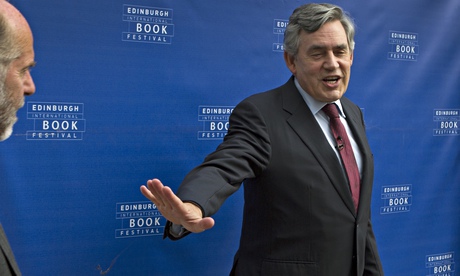
An independent Scotland that kept the pound would have a neo-colonial relationship with the rest of the UK because it would have no say over key economic and monetary decisions, Gordon Brown said on Friday.
The former prime minister was at the Edinburgh International Book Festival to talk about his book My Scotland, Our Britain, which is a personal case for Scotland being part of the UK.
One of the most contentious issues has been the subject of currency, with the Scottish National party insisting that it would keep the pound.
But Brown said Scotland's first minister, Alex Salmond, was not accepting "the logic of the position that if you're part of the UK currency and have the benefits from it and help make the decisions in it, you've got to be part of the UK parliament."
Not being in parliament, Brown said, would mean Scotland having no say over decisions like the constitution of the Bank of England, no say over the Treasury, no say over the monetary policy committee, which "would be charged to operate for the interests of England, Wales and Northern Ireland and not Scotland".
He added: "On the vital issues affecting our lives – interest rates, money supply, inflation, what happens to our living standards, employment, banking rescues. When it came to it we would have no form of input on the decisions that are being made. We'd have to accept them being made elsewhere and we would be creating, by our own decision ... a neo-colonial relationship between us and the rest of the United Kingdom.
"It is a worse outcome than now and is the worst possible outcome for Scotland."
Brown said the world was becoming increasingly interdependent, a key argument for staying together.
But one questioner who said he worked in the field of international development in Scotland said hardly any of his colleagues were in the No camp and they were some of the most internationalist of people.
Brown said that was not his experience. He said getting positive results in Africa and elsewhere required "large aid budgets" and countries cooperating "not splitting off from each other".
He recalled how important the G8 decision – when Britain was chairing the group – was in 2005 to write off £30bn debts of some of the world's poorest countries.
"It happened at the G8, which an independent Scotland would not be part of," he said.
"We can campaign all our lives, sign petitions, send messages, but we could not have been at that table where Britain led the way in getting rid of the debts of the poorest countries in the world."
All the main No supporting parties have said more devolution would come if Scotland voted no.
Brown, who said he bowed to no one in his Scottish patriotism, said: "The British constitution has to reform, it's broken, it needs to change. We are going to be as close, within a year or two, to a federal state as you can be in a country where one part of it, one nation, has 85% of the population.
"For centuries we held to this idea that Britain was a unitary state based on Westminster sovereignty, based on parliament being able to do what it wanted. None of that makes any sense any more."
Brown's visit to the festival is one of many events on the referendum issue at the festival, all of which have been either sold out or nearly so. The festival, staged in association with the Guardian, runs until 25 August.

